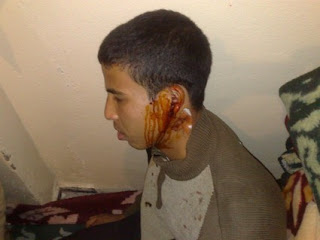The plan may choose to ignore what they mean - the movement, after all, did not crystallize as elsewhere in the occupation of a large central square. It would be preferable, however, that everyone understands what they express - manifest the existence of a large and persistent discontent among broad segments of the population. We have so far seen only at the beginning of the process by which this discontent will be expressed and found its political expression. It is impossible to predict how things will develop in the days and weeks ahead. Everything will depend on how the various forces will react and interact in the process. It is unlikely, however, in the present context, that the expressions of discontent disappear by themselves.
The fact that there was no bloodshed has generated a curious uncertainty on both sides, a sort of situation of "double bind" that seems favorable to both parties. For movement, the absence of violent confrontation and radical demands helps to legitimize the protest and could encourage other Moroccans to support or engage in it, but it could be seen as a sign of weakness.
For the regime, having avoided a brutal crackdown is to his credit, but could also boost the movement and contribute to amplify. Neither party should not underestimate the complexity of the pas de deux in which they are now engaged.For the regime in particular, respond with complacency and condescension - that is to say, consider this movement as something that can be either ignored or neutralized by the usual methods - would be a very risky bet.
It would be much more productive and smarter, to consider the message of this movement - the message that, for now, is nothing other than a desire to reconnect with the new spirit that has blown it Twelve years ago, early in the reign of Mohammed VI, to resume a promising process which many feel he was suddenly interrupted and replaced by a new version of disappointing business as usual.
With the Equity and Reconciliation Commission opened the promise of a new era of justice and responsibility, and instead we experienced after the attacks of May 16, 2003 (Casablanca), new waves of arrests The instrumentalization of fear of Islamism, torture and degrading treatment of terrorism suspects. We inaugurated a new era of freedom of the press and have come to a situation of censorship and legal harassment has caused the disappearance of much of the independent press, silenced or forced into exile many its loudest voices.
We were promised economic transparency and we fell into a situation of economic predation led by lobbyists and private interests on behalf of the monarchy. We started with the alternation, allowing opposition parties and political dissidents in a new era of open democracy, and had returned with the technical arrangements to some political normality, but it was immediately undermined by ad hoc committees.The latest of these "new" political ploys is a decidedly royalist party which may in the short term increase the power of the monarchy, but, by involving more and more in the arena of political bickering on a daily basis, undermines himself that all his legitimacy recognized until recently.
In short, many feel that the hopes and promises, the very spirit of the new reign were dropped. This is due to the fact that these hopes and promises have not been enrolled in a participatory process of entrenchment and institutionalization which would have been the only way to make them permanent and irreversible. Instead, they were once again left to the discretion of the authority. The monarchy has not committed to a viable new contract with the people.
That the movement of February 20 taught us is that these hopes and promises - those rights - may no longer be merely discretionary. We must resume our account and quickly initiate a process that people can see it's written into law and make them irrevocable. We must, in other words, revitalize and consolidate the spirit of the new reign with a new urgency - because new players have entered the political arena and they have no intention of leaving .
Our country has been a warning: change must occur and be carried out, but it will not be introduced from the top down. The captain now has a co-pilot, the Moroccan people, and it does not fall asleep at the controls.
Hicham Ben Abdallah El-Alaoui, cousin of the king of Morocco, a researcher at Stanford UniversityArticle published in the edition of 23.02.11


